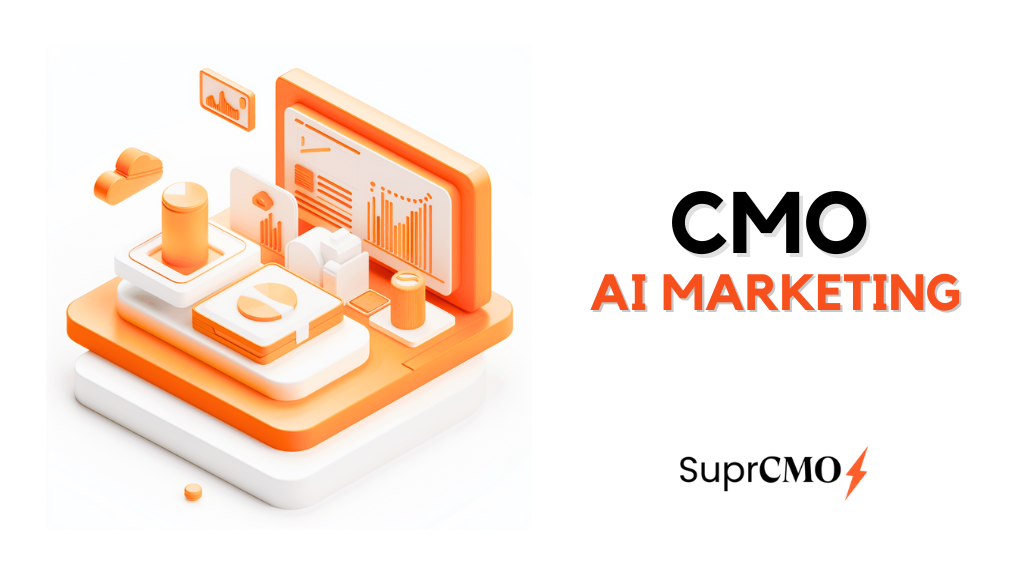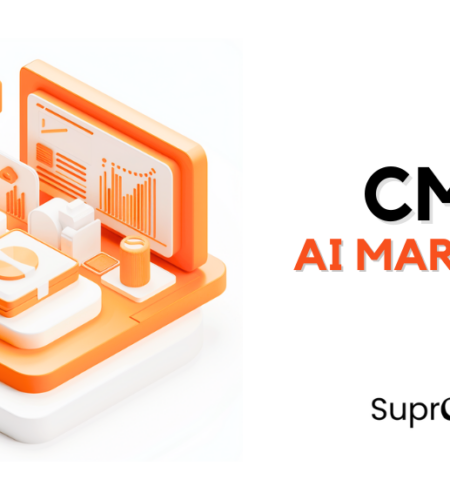
The rise of AI technology is transforming the way businesses approach marketing, and virtual CMOs are at the forefront of this transformation. As companies seek to leverage AI’s capabilities to enhance their marketing strategies and drive growth, virtual CMOs are becoming increasingly important.
One key benefit of virtual CMOs is their ability to analyze large amounts of data in real-time. This allows businesses to gain valuable insights into customer behavior, market trends, and competitor activities, which can inform their marketing strategies and help them stay ahead of the competition.
Another benefit of virtual CMOs is their ability to enable personalized marketing. By analyzing customer data, virtual CMOs can help businesses create targeted marketing campaigns tailored to individual customers’ specific needs and preferences. This can lead to improved engagement and conversion rates and increased customer loyalty.
The Rise of AI in Marketing: Revolutionizing the Industry
The marketing industry is undergoing a significant transformation as businesses embrace advanced technologies, such as AI, to enhance their marketing strategies and stay ahead of the competition. AI is becoming increasingly prevalent in marketing, and its capabilities are revolutionizing how businesses approach their marketing efforts.
One of the key benefits of AI in marketing is its ability to analyze large amounts of data in real-time. This allows businesses to gain valuable insights into customer behavior, market trends, and competitor activities, which can inform their marketing strategies and help them stay ahead of the competition.
Another benefit of AI in marketing is its ability to enable personalized marketing. By analyzing customer data, businesses can create targeted marketing campaigns tailored to individual customers’ specific needs and preferences.
Virtual CMOs: The Future of Marketing Leadership
AI technology is transforming the marketing industry, and virtual CMOs are at the forefront of this transformation. As businesses seek to leverage the capabilities of AI to enhance their marketing strategies, virtual CMOs are becoming an increasingly important tool for driving growth and staying ahead of the competition.
One of the key benefits of virtual CMOs is their ability to provide data-driven insights. By analyzing large amounts of data on customer behavior, market trends, and competitor activities, virtual CMOs can help businesses identify patterns and opportunities that can inform their marketing strategies. This allows companies to develop more effective marketing campaigns and stay ahead of the competition.
Another benefit of virtual CMOs is their ability to enable personalized marketing. By analyzing customer data, virtual CMOs can help businesses create targeted marketing campaigns tailored to individual customers’ specific needs and preferences.
Exploring the Synergy between AI and Marketing Strategies
The synergy between Artificial Intelligence (AI) and marketing strategies represents a powerful combination reshaping the marketing landscape. This synergy is creating more dynamic, responsive, and personalized marketing efforts. Here’s an exploration of how AI is harmonizing with and enhancing marketing strategies:
Customer Insights and Segmentation: AI analyzes complex and voluminous data sets, enabling marketers to gain deeper insights into customer behaviors, preferences, and trends. These insights allow for more precise segmentation, where marketers can tailor their strategies to specific groups with unique characteristics, leading to more effective targeting and personalized experiences.
Predictive Analytics: AI’s predictive capabilities are a game-changer for marketing strategies. AI can predict future buying patterns, trends, and customer needs by analyzing past consumer behavior and other relevant data. This allows marketers to anticipate market changes and customer desires, enabling them to be proactive rather than reactive in their strategy development.
Content Creation and Curation: AI-powered tools can assist in content creation by suggesting topics, generating drafts, and even producing simple content pieces. Additionally, AI can curate content for individual users, ensuring that each customer receives relevant and engaging material. This improves engagement rates and significantly reduces the time and resources spent on content management.
Personalized Marketing at Scale: One of the most impactful synergies between AI and marketing strategies is the ability to personalize at an unprecedented scale. AI can tailor marketing messages, product recommendations, and content to individual users based on their past behavior, preferences, and engagement history, significantly enhancing the customer experience and increasing conversion rates.
Optimized Advertising: AI algorithms can optimize advertising campaigns in real-time, adjusting bids, targeting, and placements based on performance data. This ensures that marketing budgets are allocated to the most effective channels and that ads reach the most receptive audiences, maximizing ROI.
Chatbots and Customer Service: AI-powered chatbots can provide 24/7 customer service, handle inquiries, provide product recommendations, and even resolve issues. This improves customer satisfaction and frees up human resources for more complex tasks, enhancing overall marketing efficiency.
Email Marketing Automation: AI enhances email marketing by optimizing send times, personalizing email content, and segmenting audiences based on their engagement levels and preferences. This leads to higher open and conversion rates, making email marketing campaigns more effective.
Social Media Insights and Engagement: AI tools can analyze social media trends, monitor brand mentions, and engage with users by responding to comments or questions. This real-time interaction boosts brand presence and engagement on social media platforms, an essential component of modern marketing strategies.
AI-powered Marketing: Unleashing the Potential of Data
In the digital age, data has become a powerful tool for businesses seeking a competitive edge. With the rise of AI technology, companies are increasingly turning to AI-driven marketing strategies to leverage the potential of data and make more informed decisions.
One key benefit of AI-driven marketing is its ability to analyze large amounts of data in real-time. This allows businesses to identify patterns and trends in customer behavior, market trends, and competitor activities, which can inform their marketing strategies and help them stay ahead of the competition.
Another benefit of AI-driven marketing is its ability to enable personalized marketing. By analyzing customer data, businesses can develop targeted marketing campaigns tailored to individual customers’ specific needs and preferences. This can lead to improved engagement and conversion rates and increased customer loyalty.
The Role of Virtual CMOs in Navigating the Digital Landscape
The marketing industry is undergoing a significant transformation as businesses embrace advanced technologies, such as AI, to enhance their marketing strategies and stay ahead of the competition. One of the key players in this transformation is the virtual CMO.
Virtual CMOs are powered by AI technology and can analyze large amounts of data in real time. This allows businesses to gain valuable insights into customer behavior, market trends, and competitor activities, which can inform their marketing strategies.
By leveraging the power of data, virtual CMOs are helping businesses develop more effective marketing campaigns and stay ahead of the competition. Additionally, virtual CMOs enable enterprises to create personalized marketing campaigns targeting specific customer segments with tailored messaging and content, leading to increased engagement and conversion rates.
Augmented Intelligence in Marketing: Paving the Way for Success
Augmented Intelligence in marketing represents an approach that combines the best of human creativity, intuition, and strategic thinking with computational power, data analysis capabilities, and automation of Artificial Intelligence (AI). This synergy is paving the way for unprecedented success in marketing by enhancing decision-making, personalization, and efficiency. Here’s how Augmented Intelligence is shaping the future of marketing:
Enhanced Decision-Making: Augmented Intelligence provides marketers with deep insights derived from data analytics yet leaves the final decision-making to human experts. This approach leverages AI to sift through vast amounts of data, identify patterns, and present actionable insights, while human marketers use their judgment and experience to make strategic decisions. This combination ensures that marketing strategies are both data-driven and human-centric.
Creative and Personalized Campaigns: While AI can analyze data and predict trends, human marketers contribute innovative ideas and emotional Intelligence that resonate with audiences on a personal level. Augmented Intelligence facilitates the creation campaigns that are targeted and efficient, imaginative, and emotionally engaging, leading to deeper customer connections.
Real-Time Adaptation and Learning: Augmented Intelligence systems can monitor campaign performance and market dynamics in real-time, providing instant feedback to marketers. This enables rapid adjustments to strategies and tactics, ensuring that marketing efforts align with consumer behavior and market trends. The continuous feedback loop and learning foster a dynamic and adaptive marketing approach.
Optimized Customer Experiences: By combining AI’s ability to analyze customer data with human understanding of nuanced customer needs, Augmented Intelligence enables the creation of highly personalized and seamless customer experiences across various touchpoints. This level of personalization enhances customer satisfaction, loyalty, and, ultimately, business success.
Efficient Use of Resources: Augmented Intelligence automates routine and repetitive tasks, allowing marketing teams to focus on strategic and creative tasks that require human insight. This boosts productivity and ensures that human and financial resources are allocated more effectively, maximizing ROI.
Conclusion:
The rise of AI technology and the increasing use of virtual CMOs are shaping the future of marketing. As businesses seek to leverage AI’s capabilities to enhance their marketing strategies and drive growth, virtual CMOs are becoming an essential tool for staying ahead of the competition.
The ability of virtual CMOs to analyze large amounts of data in real-time and enable personalized marketing allows businesses to gain valuable insights into customer behavior and develop targeted marketing campaigns tailored to the specific needs and preferences of individual customers. This can lead to improved engagement and conversion rates and increased customer loyalty.
As AI technology continues to advance, virtual CMOs are likely to become even more prevalent in the marketing industry. Businesses that embrace this technology will be well-positioned to succeed in the increasingly competitive and digital world of marketing.
Email: [email protected]


Comments